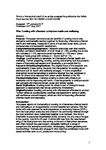Cooking with offenders to improve health and well-being
| dc.contributor.author | Parsons, Julie Milroy | |
| dc.date.accessioned | 2018-02-01T07:02:09Z | |
| dc.date.available | 2018-02-01T07:02:09Z | |
| dc.date.issued | 2017-05-02 | |
| dc.identifier.issn | 0007-070X | |
| dc.identifier.issn | 1758-4108 | |
| dc.identifier.uri | http://hdl.handle.net/10026.1/10698 | |
| dc.description.abstract |
<jats:sec> <jats:title content-type="abstract-subheading">Purpose</jats:title> <jats:p>The purpose of this paper is to demonstrate the benefits of cooking one-to-one, alongside commensality (eating together) for improving offenders’/ex-offenders’ health and well-being, measured in terms of improved social skills, cultural competencies and successful resettlement.</jats:p> </jats:sec> <jats:sec> <jats:title content-type="abstract-subheading">Design/methodology/approach</jats:title> <jats:p>Fieldwork conducted over nine months included; participant observation of lunch times (<jats:italic>n</jats:italic>=56) and cooking one-to-one with trainees (<jats:italic>n</jats:italic>=27), semi-structured interviews (<jats:italic>n</jats:italic>=23) and a “photo-dialogue” focus group with trainees (<jats:italic>n</jats:italic>=5) and staff (<jats:italic>n</jats:italic>=2).</jats:p> </jats:sec> <jats:sec> <jats:title content-type="abstract-subheading">Findings</jats:title> <jats:p>Commensality is beneficial for offenders’ health and well-being. Further, preparing, cooking, serving and sharing food is a powerful means of improving self-esteem and developing a pro-social identity.</jats:p> </jats:sec> <jats:sec> <jats:title content-type="abstract-subheading">Research limitations/implications</jats:title> <jats:p>The original focus of the research was commensality; it was during the study that the potential for cooking as an additional tool for health and well-being emerged. A future longitudinal intervention would be beneficial to examine whether the men continued to cook for others once released from prison and/or finished at the resettlement scheme.</jats:p> </jats:sec> <jats:sec> <jats:title content-type="abstract-subheading">Practical implications</jats:title> <jats:p>Everyday cooking to share with others is an invaluable tool for improving self-worth. It has the potential to build pro-social self-concepts and improve human, social and cultural capital.</jats:p> </jats:sec> <jats:sec> <jats:title content-type="abstract-subheading">Social implications</jats:title> <jats:p>Cooking lunch for others is a part of strengths-based approach to resettlement that values community involvement.</jats:p> </jats:sec> <jats:sec> <jats:title content-type="abstract-subheading">Originality/value</jats:title> <jats:p>Cooking and eating with offenders/ex-offenders is highly unusual. Further hands-on cooking/eating activities are beneficial in terms of aiding self-confidence and self-respect, which are vital for improving offenders’/ex-offenders’ health and well-being.</jats:p> </jats:sec> | |
| dc.format.extent | 1079-1090 | |
| dc.language | en | |
| dc.language.iso | en | |
| dc.publisher | Emerald | |
| dc.subject | Cooking | |
| dc.subject | Culture (sociology) | |
| dc.subject | Health | |
| dc.subject | Qualitative methods | |
| dc.subject | Taste | |
| dc.subject | Social responsibility | |
| dc.title | Cooking with offenders to improve health and well-being | |
| dc.type | journal-article | |
| dc.type | Journal Article | |
| plymouth.author-url | https://www.webofscience.com/api/gateway?GWVersion=2&SrcApp=PARTNER_APP&SrcAuth=LinksAMR&KeyUT=WOS:000402884900010&DestLinkType=FullRecord&DestApp=ALL_WOS&UsrCustomerID=11bb513d99f797142bcfeffcc58ea008 | |
| plymouth.issue | 5 | |
| plymouth.volume | 119 | |
| plymouth.publication-status | Published | |
| plymouth.journal | British Food Journal | |
| dc.identifier.doi | 10.1108/BFJ-10-2016-0453 | |
| plymouth.organisational-group | /Plymouth | |
| plymouth.organisational-group | /Plymouth/Faculty of Arts, Humanities and Business | |
| plymouth.organisational-group | /Plymouth/Faculty of Arts, Humanities and Business/School of Society and Culture | |
| plymouth.organisational-group | /Plymouth/REF 2021 Researchers by UoA | |
| plymouth.organisational-group | /Plymouth/REF 2021 Researchers by UoA/UoA20 Social Work and Social Policy | |
| plymouth.organisational-group | /Plymouth/Research Groups | |
| plymouth.organisational-group | /Plymouth/Research Groups/Institute of Health and Community | |
| plymouth.organisational-group | /Plymouth/Users by role | |
| plymouth.organisational-group | /Plymouth/Users by role/Academics | |
| dcterms.dateAccepted | 2017-01-10 | |
| dc.identifier.eissn | 1758-4108 | |
| dc.rights.embargoperiod | Not known | |
| rioxxterms.versionofrecord | 10.1108/BFJ-10-2016-0453 | |
| rioxxterms.licenseref.uri | http://www.rioxx.net/licenses/all-rights-reserved | |
| rioxxterms.licenseref.startdate | 2017-05-02 | |
| rioxxterms.type | Journal Article/Review |


